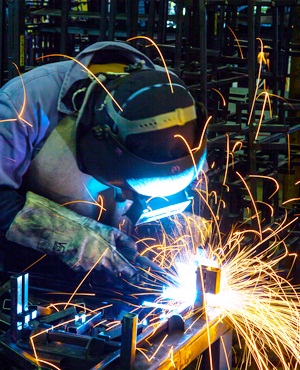
That’s the message that comes from an assessment of the sector this week by Henk Langenhoven, the chief economist of the Steel and Engineering Industries Federation of Southern Africa.
He opens with an urgent plea for a strong partnership between government, business and labour “to prevent the metals and engineering sector from withering into oblivion”.
“Without doubt, the metals and engineering sector is going through a fundamental structural adjustment, and not just a cyclical correction,” he says.
This, coupled with an analysis of how the sector has struggled to recover from the global financial crisis of 2008/09, and fears that depressed markets for both commodities and metal products may last for between 10 and 20 years before the cycle turns, is bad news for everyone in South Africa, from government to the armies of the unemployed.
Balanced against the unrelenting bad news dragging the manufacturing sector down, government’s claims that it is reindustrialising the country seem empty, and plans to create 100 industrialists are little more than good intentions.
Between 1994 and 2008, the sector reaped a post-liberation dividend, growing by 94%, until 2008’s crisis pulled the rug out from underfoot.
In the year of the global financial crisis, the sector contracted by a devastating 21%.
“Since then, the sector expanded by about 6%, but the level of value added to the economy today is still 16% lower, and output is 25% lower than at the peak of 2007/08,” says Langenhoven.
“Profit margins peaked in 2005 and thereafter halved from an average of 10% to 5% [over the years from 2006 to 2014]. Fixed investment in the sector halved from its peak of more than 6% in 1994 to 3% since 2000.”
If the numbers seem dry and depressing, it is because they are.
The many reasons for dreadful performance now and into the future pile up like IOUs in Greece, as Langenhoven draws a bead on export markets.
“Prices for South African exports are also depressed, and may continue to be so for a long time.
“Research shows that metal-price cycles last, on average, for 35 years: the latest cycle started in 1999 and reached its peak in 2007, and the downswing has already lasted seven years. This means there may be another 10 to even 20 years of depressed markets left.
“Unplanned electricity outages have risen from 1% in 2005 to 15% today, and these can cost the sector production losses of up to 25%,” he adds.
“The SA Reserve Bank calculated that electricity shortfalls can cost the country 0.5 percentage points of gross domestic product growth, which means 25% lower growth.
“Most energy-intensive users are still consuming below their 2008 levels, and the opportunity costs of installing emergency and standby capacity is a staggering 35% of all investment in the sector in 2013.”
Noting that it took 10 years for energy supplies to reach this constrained point, he predicts that “current instability is likely to last for two to three years”.
Langenhoven says only the vehicle-manufacturing sector shows growth thanks to exports, while both the mining and construction sectors are limping along at pedestrian growth rates, if at all.
“The consequences of the rise of China and India, as well as the structural adjustments taking place in those economies, will be significant,” he explains.
“There are massive surpluses generated in those markets, which find their way on to the world market.
“The current rebalancing taking place will shift their input-demand patterns downward permanently. Demand out of Africa could decline in sync, owing to its dependence on Chinese demand for its commodities for its own growth.
“The locomotive power of the Chinese economy of the past 20 years will not be repeated. The metals and engineering sector – with its symbiotic relationship with the auto, mining and construction industries – is going through a structural correction on its development trajectory.
“Innovation in terms of business solutions, better social cohesion between business and labour, and policy adjustments from government are urgently needed to prevent the sector from withering away.”




 Publications
Publications
 Partners
Partners








